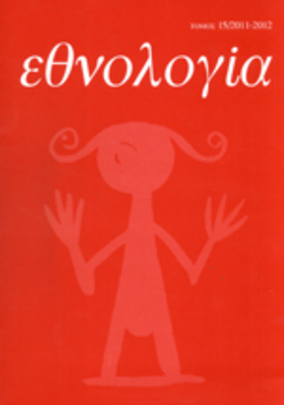Τα ελληνικά της Καλαβρίας : μεταξύ περιθωριοποίησης και επανεκτίμησης: προβλήματα και προοπτικές
Part of : Εθνολογία : περιοδική έκδοση της Ελληνικής Εταιρείας Εθνολογίας ; Vol.3, No.1, 1994, pages 189-214
Issue:
Pages:
189-214
Parallel Title:
The Greek language in Calabria : between marginalization and reevaluation problems and perspectives
Author:
Abstract:
The Grecarne -as the Greek dialect spoken until today by the inhabitants of the villages of Galileiano and Roghundi is called- is perhaps the most threatened linguistic minority of the Italian state.Marginalized for centuries -as many other oral or less spoken languages- since 1968, the Grecarne has claimed its rightful place not only in the geographical, social and political environment in which it acted, but on a wider, international level. Thus, the identity of today’s Greek speaking populations was constructed around these two axes of marginalization and réévaluation. Carrying a heavy legacy of social discrimination as speakers of a foreign language (stigma of social inferiority with respect to the nearby Italian speaking environment) as well as Southerners (stigma of social inferiority with respect to the Italians of the North), the Greek speaking peasants of Calabria constructed their linguistic, social and cultural identity on the constant rejection and renunciation of their own language.The first Greek speaking cultural association, «La Ionica dei Greci di Calabria», established in 1968 tried to fight against this feeling of shame and social inferiority. A series of initiatives and activities such as offering scholarships for learning Modern Greek in Greek Universities, the organization of Conferences, the fraternization of Greek speaking municipalities with municipalities in Greece etc., apparently have not functioned as factors of preservation of the Greek of Southern Italy, since language does not constitute an independent entity, but rather an organic part of a specific social, economical, political and cultural reality and every attempt to be treated in its own right, beyond and outside this reality is condemned with failure.Taking into consideration the fact that the Greek speaking communities are situated in one of the poorest regions of the Italian South, it is easy to understand how precarious the future of the Greek language in Calabria is. This is best understood, if we try to see things in a comparative manner, paralleling Grecanic to other less spoken languages in regions, not in the southern, but in the -industrially advanced- northern parts of Europe, e.g. Wales. No similarities can be found between the two realities. The only common point is of purely nominal importance: both Grecanic and Welsh are classified as Less Used or Spoken Languages of the European Union. The means at the disposal of the region of Wales for the promotion of the Welsh language are non existent and unthinkable for the Greek speaking populations of Calabria. Economic prosperity, written tradition and numerical importance constitute three main factors that may help a less spoken language continue to exist if, and for as long as, something like that is indeed feasible. The Greek speaking communities of Calabria lack all of the above.
Subject:
Subject (LC):
Notes:
Διευρυμένη μορφή σύντομης ανακοίνωσης που έγινε στο Διεθνές Συνέδριο με θέμα «Ελληνική γλώσσα και πολιτισμός στη νότια Ιταλία. Οι ελληνόφωνες κοινότητες της Καλαβρίας και της Απονλίας: προβλήματα και προοπτικές», Bova Marina 13-15 Μαΐου 1994, που οργάνωσε ο ελληνόφωνος πολιτιστικός Σύλλογος «Γιαλός του Βούα», υπό την αιγίδα της Επιτροπής των Ευρωπαϊκών Κοινοτήτων και του ελληνικού Υπουργείου Παιδείας, Περιέχει εικόνες, χάρτες, βιβλιογραφία και αδημοσίευτο υλικό




